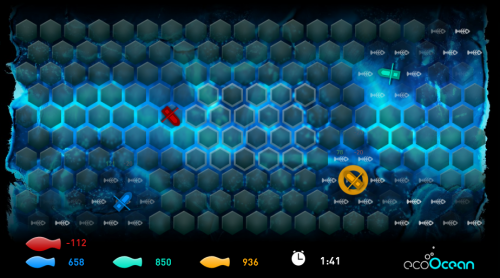Using gameplay to challenge our understanding of sustainable fishing

A new and innovative computer game has been developed that allows players to experience and explore the complexities of sustainable fishing. The game has been used as an interactive stakeholder communication measure by the EC-funded SOCIOEC project, an initiative that was dedicated to investigating the socio economic effects of fisheries management measures of the Common Fisheries Policy (CFP). The game allows players to directly investigate the effects of different fisheries management measures on fishermen's behaviour. It was also used to engage fishermen in discussions about possible incentives of different management measures aiming to conserve fish stocks in European waters.
This game is based on an earlier version of the ecoOcean overfishing simulation game, which was originally developed by the "Future Ocean" Cluster of Excellence at Kiel University, Germany, as an engaging, interactive tool for illustrating the challenge of sustainable fisheries to the public. The updated SOCIOEC version of the game can be used to inform fisheries stakeholders and the wider public about the effects of different management scenarios, specifically the effect of closed areas and the Landing Obligation, a new measure that eliminates the wasteful practice of discarding.
The primary goal of this computer game is to demonstrate the "common pool" problem. Players aim to gain as many points as possible by catching fish. All players rely on the same fish stock and therefore compete for the same resource, as occurs in common pool scenarios. The game is parameterised in such a way that the fish stock will be depleted more quickly if all the individual players just try to catch as many fish as they can. Only by communicating and sticking to common rules can a sustainable, higher overall catch be achieved by all players.
Dennis Nissen, from Naymspace Software, who was responsible for all programming necessary to develop the SOCIOEC ecoOcean gametable software, said: "The game is not intended to be a "casual" game played by individuals at home for fun, but has been designed as an educational multi-player game that can be played by up to four players on one computer, with each player using a separate computer mouse as a controller."
The SOCIOEC version of ecoOcean includes the gaming environment and an editing tool that allows players to adjust the parameters of the ocean environment to mimic real-life scenarios. The ocean environment features two different fish age classes and two different fish species, with different migration behaviour and growth parameters. Players can choose between different fishing gears, and various management measures can be applied, including closed areas and total allowable catch with and without the Landing Obligation. All parameters, including cost for fishing, cost for steaming, boat speed, loading capacity and quota, as well as the growth and migration of fish species, can be changed to develop different scenarios to be tested and played.
More information: Download the SOCIOEC version of ecoOcean here: socioec.eu/outputs/ecoocean-socioec
Provided by AquaTT

















